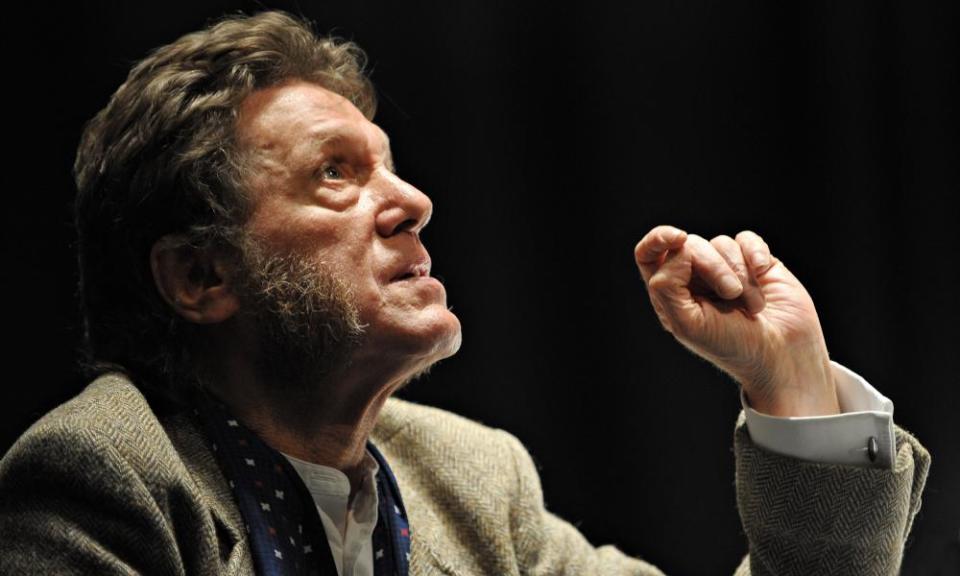Keith Tippett: the jazz great who saw music as a source of goodness

When his daughter Inca was small, Keith Tippett overheard her saying that her father was a “mujician”. It was a title he appropriated for an outstanding series of solo piano recordings, but it fitted most of the things he did during a long and varied career. If Tippett was on the bandstand, in whatever musical context, however spontaneous or prepared, magic was likely to occur.
Related: Keith Tippett: British jazz pianist dies age 72
It took some sort of alchemical instinct to dream up and then carry off the 1970 project called Centipede, a band of 50 musicians – 100 legs – featuring members of King Crimson, Soft Machine, Blossom Toes and Patto, alongside a classical string section and free-jazz musicians from groups such as the Spontaneous Music Ensemble and Brotherhood of Breath. The audience assembled for their debut at the Lyceum theatre in London could see Robert Wyatt, Karl Jenkins, Zoot Money, Robert Fripp and the singer formerly known as Julie Driscoll rubbing shoulders as they performed a sprawling piece titled Septober Energy, in which the composer attempted to present all the facets of his extraordinary orchestra.
As an example of what has been called Tippett’s “utopian” outlook, it took some beating. At times prolix, at others exhilarating, veering from the most delicate of textural explorations to full-on heavy rock and unfettered free improvisation while privileging no individual reputations, it symbolised the open attitudes of a particular time and place, one in which Tippett could appear on Top of the Pops with King Crimson, playing free-jazz piano on their single, Cat Food, and the teenaged Mike Oldfield could leave the Lyceum after the Centipede gig with the germ of the idea for Tubular Bells.
Glimpsing a potentially profitable interface between progressive rock and a new jazz generation, the music business showed an interest. When he arrived in London from his native Bristol in the late 60s, Tippett had assembled a sextet of young players. They made an album for Giorgio Gomelsky, the record producer who had been involved with the Rolling Stones and managed the Yardbirds. Their second album was for Vertigo, the progressive rock imprint of the giant Phillips company. Neon, RCA’s progressive sub-label, was the vehicle for the recorded version of Septober Energy.

No doubt, given the names involved, the company had been hoping for a hit of some sort. But it failed to sell in significant quantities, and when Tippett, in a typical display of artistic fearlessness, then presented them with a couple of albums of small-group free improvisations, not even the presence of Julie – by then Tippett’s wife, adopting his surname in its original form, as Julie Tippetts – could retain their interest. Thereafter Tippett’s albums were released by small labels specialising in the more adventurous end of jazz and improvisation.
The era of general optimism for that generation ended in the middle of the 1970s, when the record industry realised that the money was elsewhere, but Tippett remained a positive force in British music. His core belief was that when the music started, goodness would happen. Not just good music but good human connections. In 1987, he and Julie released their first album as a duo, Couple in Spirit, a title perfectly describing a relationship that survived long periods when work was hard to find.
In his youth, Tippett had been a chorister and a church organist, and the one thing his music always did, however extreme its procedures, was sing. A rare, wonderful and very personal lyricism pervaded even Linükea, his extended piece for piano and string quartet, premiered at the Bath festival in 1996.
Related: Sign up for the Sleeve Notes email: music news, bold reviews and unexpected extras
His solo piano concerts were intimate epics in which virtuosity was placed in the service of spontaneous creativity and the profound joy of discovery. His duos, sometimes with fellow pianists Howard Riley and Stan Tracey, were marvels of empathy. His continuing interest in larger ensembles was shown by the creation of Ark, a smaller, acoustic version of Centipede, in 1978, by his role in the Dedication Orchestra in 1992, by his performances in Italy with Pino Minafra’s Canto General, and by the octet, his last band, with which he recorded The Nine Dances of Patrick O’Gonogon, a suite based on Irish folk themes in which he braided all the strands of music that had formed him into one glorious summary.
Before a performance of that work in Berlin in 2015, I was surprised, after knowing him for almost the entirety of his 50-year professional career, to discover how nervous and fretful he could become before a performance. Anyone presenting Tippett at a festival or on a concert stage needed the local piano tuner’s home number on speed-dial, even though the pristine Steinway had been tuned twice already on the day of performance. But when the music started, all anxiety dissolved and the spontaneous magic took over.

 Yahoo News
Yahoo News 
